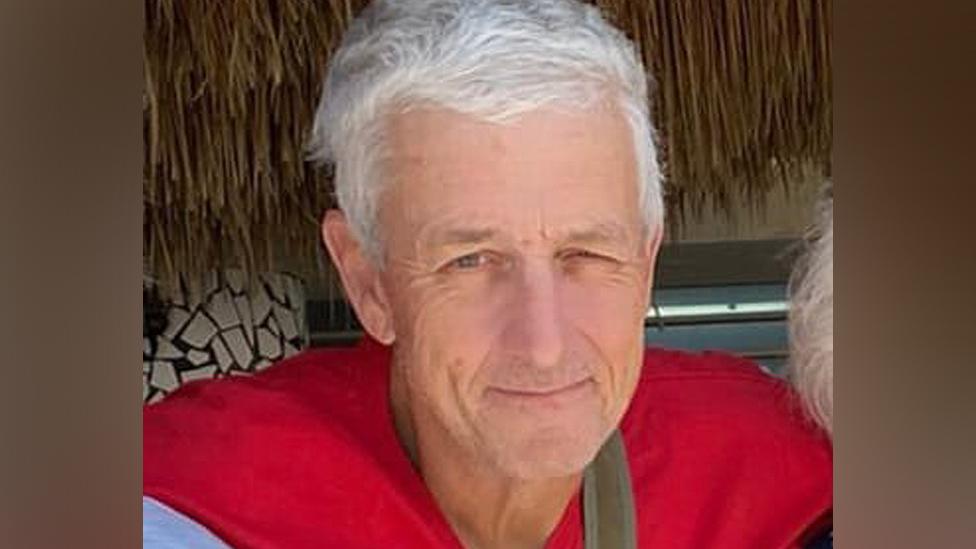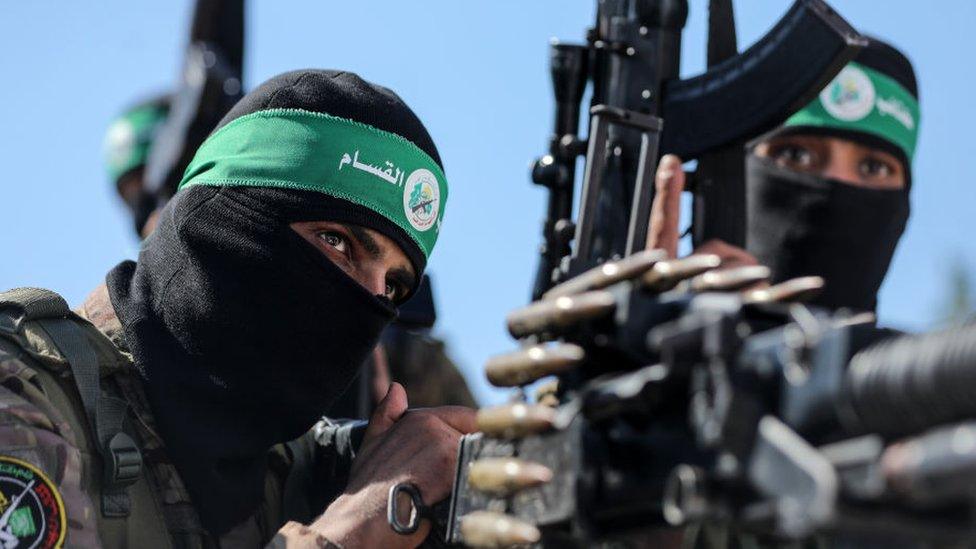Israel-Gaza attacks: Humza Yousaf's wife fears for 'terrified' family
- Published
Nadia El-Nakla tells of her fears for the future of her family trapped in Gaza
The wife of Scotland's First Minister Humza Yousaf said her parents, who have been trapped in Gaza since the Hamas attack on Israel, are "terrified" about what might happen next.
Nadia El-Nakla also told BBC News some relatives have had their homes destroyed in missile strikes.
Elizabeth El-Nakla and Maged El-Nakla, who live in Dundee, travelled to Gaza last week to see a sick relative.
Days into their trip Hamas killed 1,200 people, Israeli officials say.
Palestinian health officials say 1,200 people have died in Israeli airstrikes in Gaza as the death toll continues to rise in the conflict.
On Tuesday Mr Yousaf called for the creation of a humanitarian corridor in and out of locked-down Gaza.
Mr and Mrs El-Nakla were visiting their son - a father-of-four - and Mr El-Nakla's 92-year-old mother, who is ill.
Ms El-Nakla said: "They are now caught up in a war situation.
"My mother says that there is continual bombardment from land, sea and air."
She said her mother had not slept since Monday and feels as if "every part of her body is shaking".
The family had hoped to escape on Tuesday but the Rafah border, between Gaza and Egypt, was bombed and all Israeli crossings have been shut.
Speaking in Bute House, the first minister's official residence in Edinburgh, Ms El-Nakla said: "They are just terrified, absolutely terrified, about what is to come and what is happening right now as we speak."
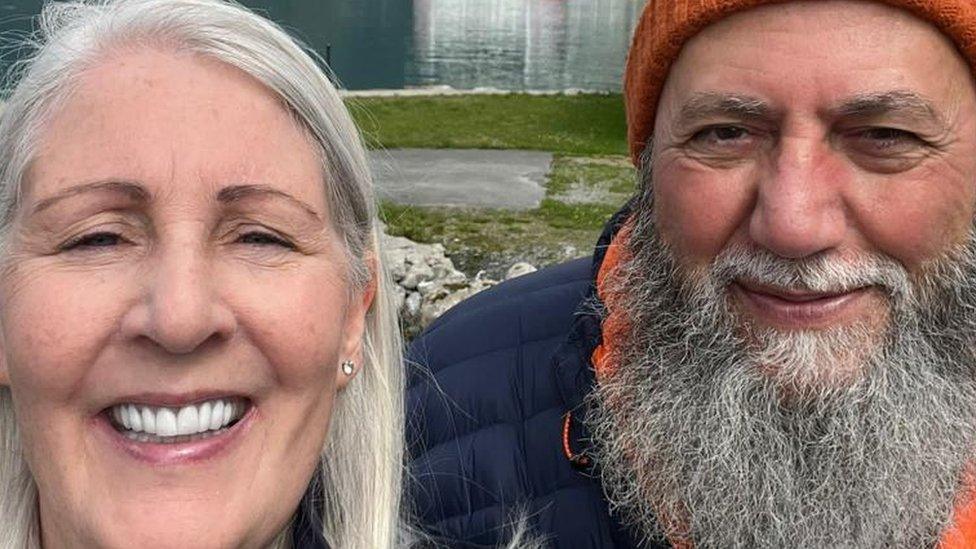
Elizabeth El-Nakla and Maged El-Nakla, who are from Dundee, were visiting family in Gaza when the Hamas attacks happened
The Dundee City councillor said she was troubled by the language emanating from the conflict, especially claims Gaza would be "obliterated" in response to the Hamas attacks.
She added: "It puts the complete fear into me that I am never going to see them again."
Since the air strikes started, her aunt and cousin have had their homes reduced to rubble.
Ms El-Nakla spoke to the Foreign, Commonwealth and Development Office on Wednesday but at the moment there is no way out.
Should that change, she believes her parents would face an "impossible decision" as her other relatives do not have UK passports.
Ms El-Nakla said: "At times my arms feel like lead and it feels like I am just living in a nightmare for them. So I can't understand how they feel."
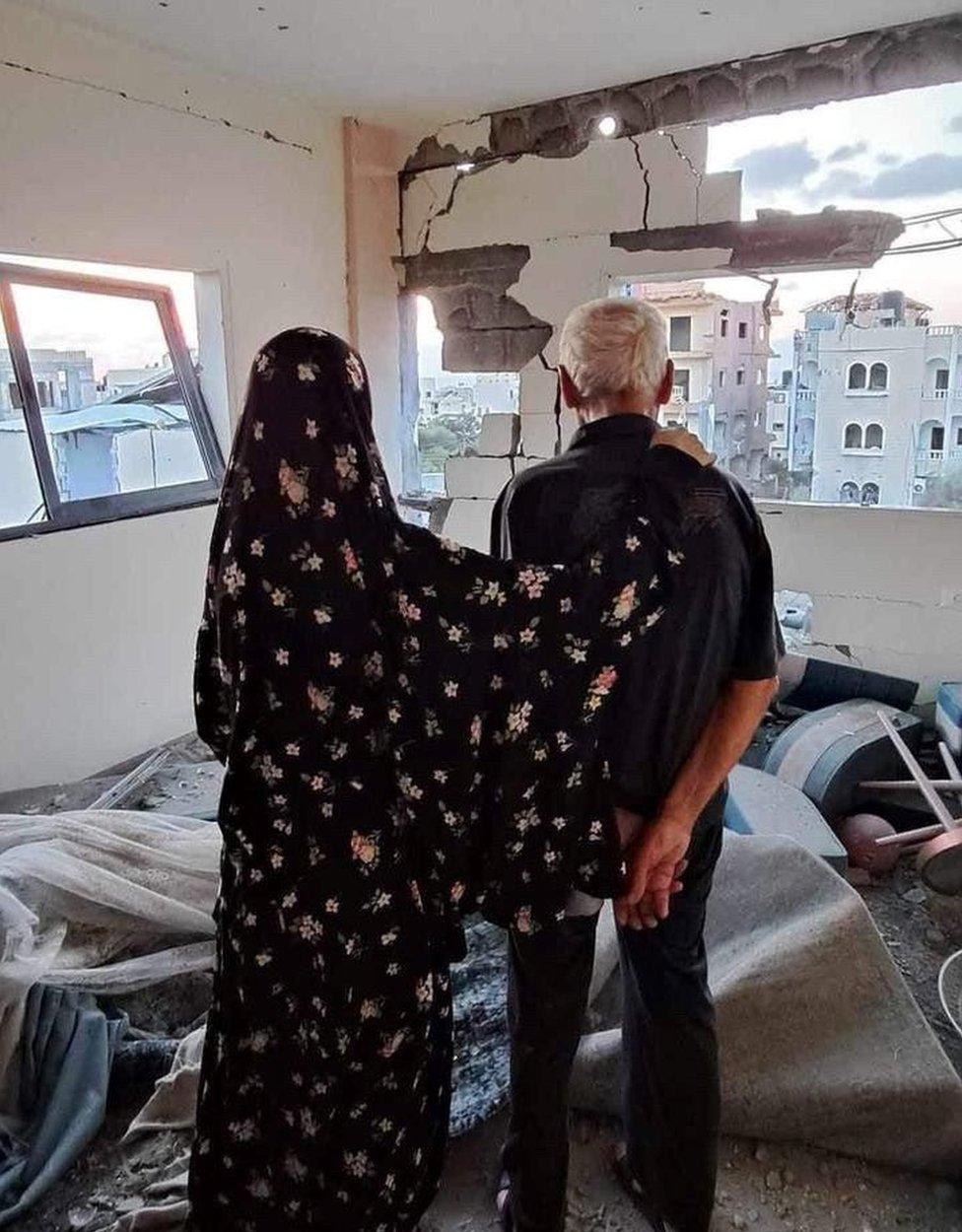
Ms El-Nakla's aunt and uncle's home was struck by a missile
The mother-of-two has a number of scenarios going through her head and has warned against any cuts to aid.
She said: "This needs to be a time when medical resources, food, water, basic human needs are met. That is international law. It is really vital.
"That's my fear. First is they die. Second is they are starving. Three is the house is put to rubble and they are in camps.
"That is really scary."
Ms El-Nakla is also worried about the impact on her brother's young children, especially her eight-week-old nephew.
She added: "Every time the bombs go off his arms just flail in fear. I fear that his little heart can't take that continual bombardment."
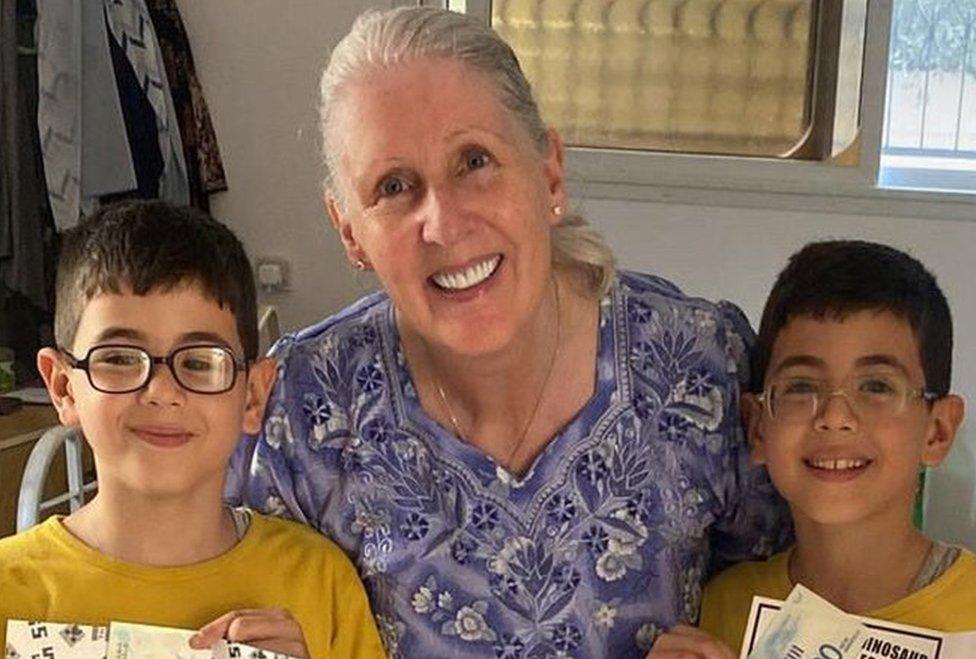
Ms El-Nakla's mother, Elizabeth, with her twin grandsons, who had their ninth birthday on Wednesday
Earlier, her mother recorded a moving 40-second video clip from the city of Deir al-Balah in which she detailed the family's plight.
Close to tears, she said: "We have no electricity. We have no water. The food we do have, which is little, will not last because there is no electricity and it will spoil.
"I have four grandchildren in this home - a two-month-old baby, a four-year-old and, today, two nine-year-old twins. Their birthday.
"I ask the world to help the Palestinians."
Lieutenant Colonel Jonathan Conricus, international spokesman of the Israel Defense Forces, said that Gaza "was not a good place to be" for the family and added that as far as he knew it was not possible for them to leave just now.
He told BBC Scotland News: "I think this will be a very long war, our military aim is to strip Hamas of all its military capability."
Why can't the El-Nakla's cross the border into Egypt?
All movement into and out of Gaza is controlled by the Israeli authorities, except the pedestrian-only Rafah crossing between Gaza and Egypt's Sinai peninsula, which is controlled by the Egyptian authorities.
This has come under bombardment from Israel in recent days and, according to the BBC's Egypt correspondent Sally Nabil, Egyptians are concerned about being dragged into the conflict.
Speaking on the BBC Radio's Good Morning Scotland programme, she said: "There might be a possibility that Egypt will be asked to open the borders for Gaza residents to walk into the Sinai peninsula.
"That would put Egypt in a very tight position because at that point it will be one of the countries on the front line and Egyptians do not want that.
"We are not just talking about official circles here but even the people. They don't want to be a part of the confrontation.
"There is this dilemma of whether or not to open the borders. They want to open the borders just to send in humanitarian aid to Gaza but they don't want the residents of Gaza to move into Sinai."

More on Israel Gaza war
Follow live: Latest updates
Hostages: Who are the people taken from Israel?
Bowen: Inside Israeli border village where Hamas killed families in their homes
History behind the story: The Israel-Palestinian conflict

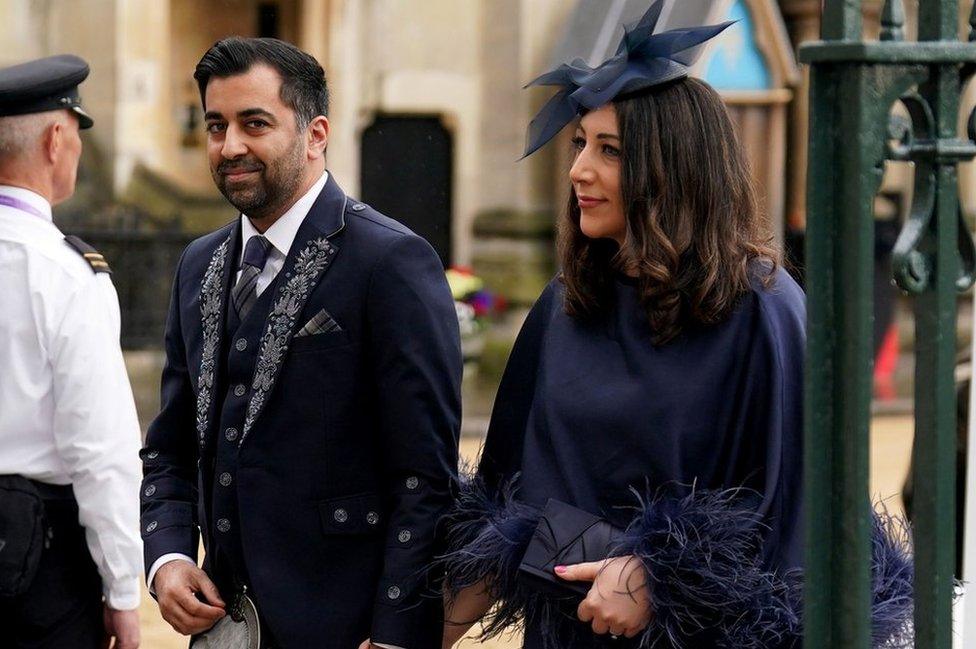
Humza Yousaf and Nadia El-Nakla pictured at the King's Coronation in May
Meanwhile, Mr Yousaf has urged the foreign secretary to call for a ceasefire in Israel and Gaza.
In a letter to James Cleverly, external, the first minister urged him to use the positive relationship between the UK and Israel to push for civilians in Gaza to be allowed to leave through the Rafah border.
He wrote: "Too many innocent people have already lost their lives as a consequence of these completely unjustifiable and illegitimate attacks by Hamas.
"However, innocent men, women and children cannot, and should not, pay the price for the actions of a terrorist group."
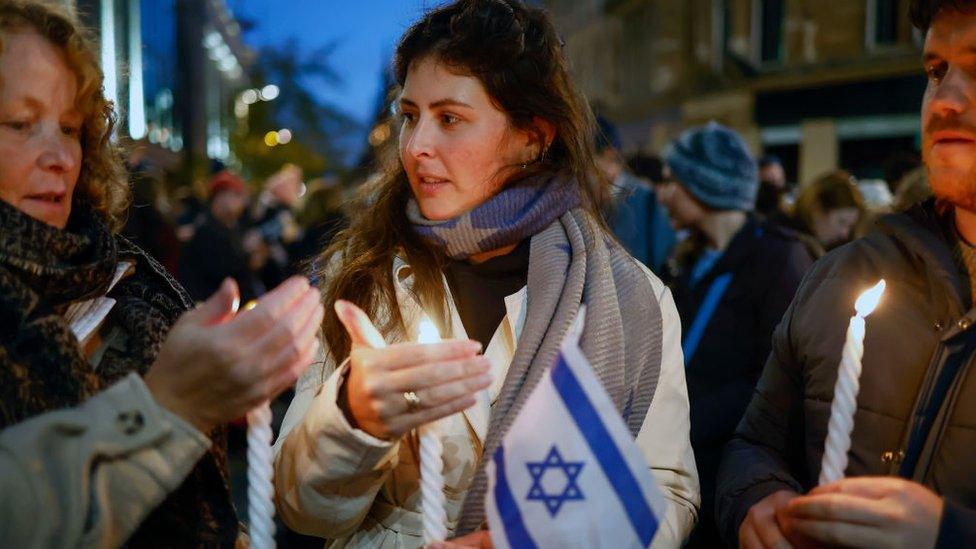
A candle-lit vigil was held by the Glasgow Jewish community on Wednesday evening
The Glasgow Jewish community has held a "silent and peaceful" vigil for the victims in Israel on the steps of the Royal Concert Hall.
Among those remembered was grandfather Bernard Cowan, who was confirmed on Monday as the first Scottish victim of the Hamas assault on Israel.
Mr Cowan grew up in the Glasgow area and settled in Israel, near the Gaza border, with his wife and three children.
On Wednesday an official UK source told the BBC 17 British nationals, including children, are dead or missing in Israel.
Related topics
- Published10 October 2023
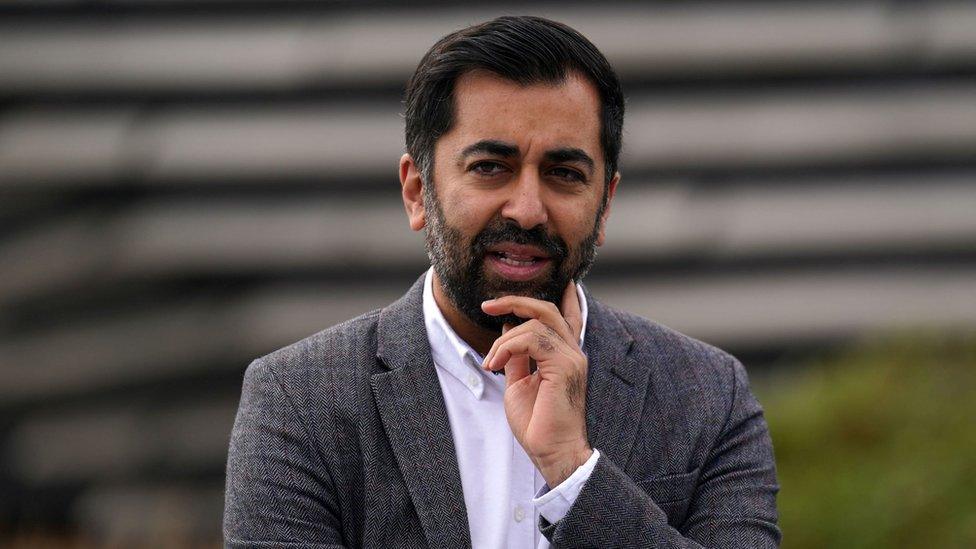
- Published9 October 2023
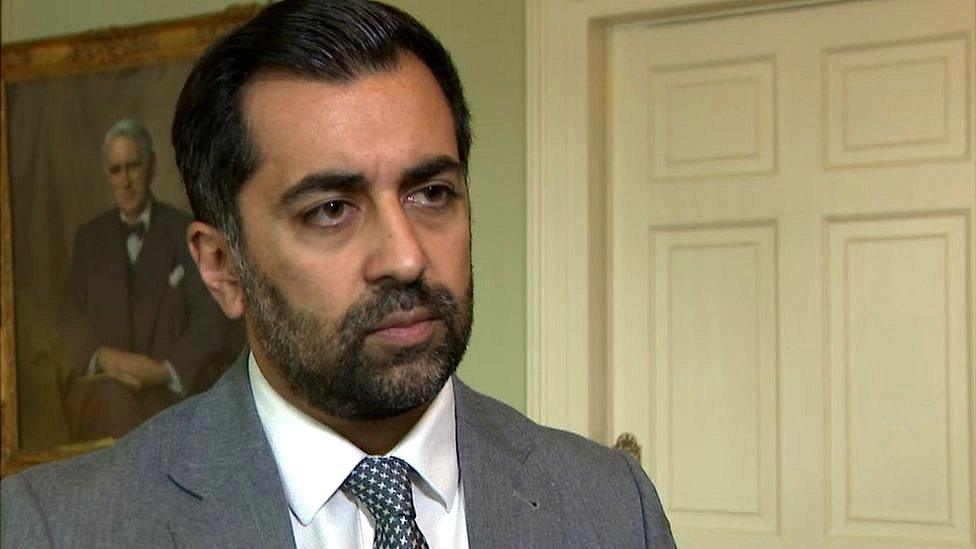
- Published9 October 2023
